|
|
|
Sort Order |
|
|
|
Items / Page
|
|
|
|
|
|
|
| Srl | Item |
| 1 |
ID:
168587


|
|
|
|
|
| Summary/Abstract |
This paper addresses an early case in critical and anarchist geopolitics by analysing a body of work from Spanish geographer Gonzalo de Reparaz Rodríguez-Báez (1860–1939). After reconstructing the complex and contradictory figure of Reparaz, a scholar and activist who oscillated between very different political positions in his especially long and productive career, we focus on the geostrategic writings he produced for the anarchist journals, CNT, Fragua Social and Solidaridad Obrera during the Spanish Civil War of 1936–1939. Our argument is twofold. First, in the ideological wanderings of Reparaz, it is possible to identify some elements of coherence around the principles of Iberism, Federalism and Africanism as produced by the Spanish culture of that time. Second, the works he produced for the anarchist press in the last part of his life can provide important insights for present-day scholarship on critical, radical and anarchist geopolitics, especially on what an ‘anarchist geopolitics’ might look like and which ways it can contribute to the largely debated problem of exiting the ‘territorial trap’. The case we present contributes to these debates by showing that an anarchist engagement with ‘geopolitics’, a term that Reparaz used some times at the end of his career, might draw on challenging clashes of civilization and ‘pure’ identities, on questioning statist and administrative frameworks of analysis and on focusing more on grassroots activism than on providing advice for state strategies.
|
|
|
|
|
|
|
|
|
|
|
|
|
|
|
|
| 2 |
ID:
112524
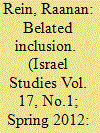

|
|
|
|
|
| Publication |
2012.
|
| Summary/Abstract |
This article analyzes the changing attitudes of the Israeli authorities towards the Jewish veterans of the International Brigades, most of them Communists. Following a brief overview of Jewish participation in general and Jewish Palestinian participation in particular in the Spanish Civil War, we focus our attention first on the initial reactions to the returning volunteers and then on two major events in the process of memory appropriation and gradual inclusion of these fighters in the Israeli national narrative: the 1972 Tel-Aviv conference of Jewish fighters in Spain, sponsored by the Histadrut, and the 1986 speech by Israeli president Chaim Herzog on the 50th anniversary of the outbreak of the Spanish Civil War. Once the fighters' documents were deposited in the archives of the Israel military in the 1990s, the process was complete. Now they could be portrayed as Jewish heroes, national patriots fighting to protect their people and their homeland, Israel.
|
|
|
|
|
|
|
|
|
|
|
|
|
|
|
|
| 3 |
ID:
048729
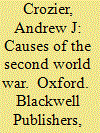

|
|
|
|
|
| Publication |
Oxford, Blackwell Publishers, 1997.
|
| Description |
xvi, 319p.: maps.Pbk
|
| Series |
History of the Contemporary World
|
| Standard Number |
0631186018
|
|
|
|
|
|
|
|
|
|
|
|
Copies: C:1/I:0,R:0,Q:0
Circulation
| Accession# | Call# | Current Location | Status | Policy | Location |
| 039193 | 940.5311/CRO 039193 | Main | On Shelf | General | |
|
|
|
|
| 4 |
ID:
110974
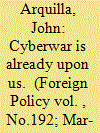

|
|
|
|
|
| Publication |
2012.
|
| Summary/Abstract |
In the nearly 20 years since David Ronfeldt and I introduced our concept of cyberwar, this new mode of conflict has become a reality. Cyberwar is here, and it is here to stay, despite what Thomas Rid and other skeptics think.Back then, we emphasized the growing importance of battlefield information systems and the profound impact their disruption would have in wars large and small. It took just a few years to see how vulnerable the U.S. military had become to this threat. Although most information on cyberwar's repercussions -- most notably the 1997 Eligible Receiver exercise -- remains classified, suffice it to say that their effect on U.S. forces would be crippling.
|
|
|
|
|
|
|
|
|
|
|
|
|
|
|
|
| 5 |
ID:
153769
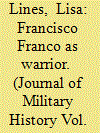

|
|
|
|
|
| Summary/Abstract |
Although he was the military leader of the winning Nationalist side during the Spanish Civil War, Francisco Franco’s place in history has been largely defined by his subsequent long-term political role as head of the Spanish fascist state. Up to now, those historians who have assessed his military acumen have tended to give him low marks, particularly on the grounds that his poor grasp of strategy and tactics unnecessarily prolonged the Civil War and led to an inordinately high number of casualties. Recently, however, some historians have begun to reconsider Franco’s skills as a military leader, by viewing his performance within the context of his own cultural and political environment, rather than that of a later era or of other national military traditions.
|
|
|
|
|
|
|
|
|
|
|
|
|
|
|
|
| 6 |
ID:
160177
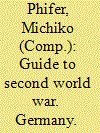

|
|
|
|
|
| Publication |
Germany, Scribbles, 2018.
|
| Description |
v, 672p.pbk
|
| Contents |
Vol. I
2 Vol. Set Price is Rs. 3500.00
|
| Standard Number |
9789387513051
|
|
|
|
|
|
|
|
|
|
|
|
Copies: C:1/I:0,R:0,Q:0
Circulation
| Accession# | Call# | Current Location | Status | Policy | Location |
| 059444 | 940.53/PHI 059444 | Main | On Shelf | General | |
|
|
|
|
| 7 |
ID:
160178
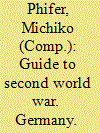

|
|
|
|
|
| Publication |
Germany, Scribbles, 2018.
|
| Description |
v, 673-1338p.pbk
|
| Contents |
Vol. II
2 vol. set Price is Rs. 3500.00
|
| Standard Number |
9789387513051
|
|
|
|
|
|
|
|
|
|
|
|
Copies: C:1/I:0,R:0,Q:0
Circulation
| Accession# | Call# | Current Location | Status | Policy | Location |
| 059445 | 940.53/PHI 059445 | Main | On Shelf | General | |
|
|
|
|
| 8 |
ID:
170988
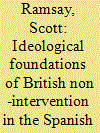

|
|
|
|
|
| Summary/Abstract |
In response to the outbreak of the Spanish Civil War in 1936, the British government adopted and maintained a policy of strict non-intervention throughout the conflict. Previous commentators, to varying degrees, have suggested this policy was largely a product of British hostility towards the Spanish Republic and designed to facilitate a victory for the military rebels who would subdue threats of a communist revolution. This analysis argues that historians have exaggerated British concerns about communism and that Britain saw the Republic as a viable political project that it wanted to succeed. Rather than focusing on British perceptions of only left-wing groups in Spain, this analysis also incorporates perceptions of the extreme right and fascist groups. British concerns about Spain’s political polarisation laid the foundations of the policy of non-intervention, which sought to avert risks of the conflict escalating and solidifying the broader ideological polarisation occurring in Europe during the 1930s.
|
|
|
|
|
|
|
|
|
|
|
|
|
|
|
|
| 9 |
ID:
111748
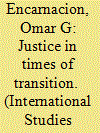

|
|
|
|
|
| Publication |
2012.
|
| Summary/Abstract |
A key contention of the transitional justice movement is that the more comprehensive and vigorous the effort to bring justice to a departed authoritarian regime for its political crimes, the better the democratization results. This essay challenges this common assumption with empirical evidence from the Iberian Peninsula, where the global wave of democratization of the late twentieth century was born. In Portugal, political trials and bureaucratic purges intended to cleanse the state and society of the authoritarian past nearly derailed the transition to democracy by descending into a veritable political witch-hunt. In Spain, by contrast, forgetting and moving on prevailed, an approach that facilitated the country's emergence as the paradigmatic example of a successful democratic transition. Among the many lessons suggested by these counter-intuitive examples is that there is no pre-ordained outcome to any attempt at transitional justice. This is so because the principal factors driving the impulse toward justice against an old regime tend to be political in nature rather than ethical or legal. In Portugal, the rise of transitional justice mirrored the radicalism of the left-wing revolution that launched the transition to democracy. In Spain, the absence of transitional justice reflected the pragmatism imposed by the self-reinvention of the authoritarian regime and the political trauma inflected by the Spanish Civil War.
|
|
|
|
|
|
|
|
|
|
|
|
|
|
|
|
| 10 |
ID:
027465


|
|
|
|
|
| Publication |
London, Hodder and Stoughton, 1979.
|
| Description |
xvi, 1084p.Hbk
|
| Standard Number |
0340163593
|
|
|
|
|
|
|
|
|
|
|
|
Copies: C:1/I:0,R:0,Q:0
Circulation
| Accession# | Call# | Current Location | Status | Policy | Location |
| 018608 | 940.5312/TAY 018608 | Main | On Shelf | General | |
|
|
|
|
| 11 |
ID:
001251


|
|
|
|
|
| Publication |
London, Routledge, 1985.
|
| Description |
xv, 46p.Pbk
|
| Standard Number |
0415065909
|
|
|
|
|
|
|
|
|
|
|
|
Copies: C:1/I:0,R:0,Q:0
Circulation
| Accession# | Call# | Current Location | Status | Policy | Location |
| 040781 | 940.5311/HEN 040781 | Main | On Shelf | General | |
|
|
|
|
| 12 |
ID:
116798
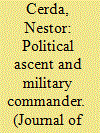

|
|
|
|
|
| Publication |
2011.
|
| Summary/Abstract |
On 17 July 1936 a military coup against the leftist Popular Front government in Spain began with a military uprising in Spanish Morocco, marking the start of the lethal three-year Spanish Civil War. Unforeseen setbacks to the military leaders' plans in July and August 1936 radically altered the strategic situation, and gave Major General Francisco Franco a unique opportunity. This essay seeks to understand how he used that opportunity, rising from being merely another general supporting the uprising in July to the position of commander-in-chief of the Nationalist army and head of government less than three months later.
|
|
|
|
|
|
|
|
|
|
|
|
|
|
|
|
| 13 |
ID:
133221
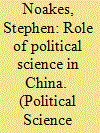

|
|
|
|
|
| Publication |
2014.
|
| Summary/Abstract |
INTELLECTUALS HAVE HISTORICALLY BEEN AMONG the foremost advocates of political reform in repressive autocratic states. During the early decades of the twentieth century, scholars and writers served as chief witnesses to the atrocities arising from events such as the Spanish Civil War, Nazism, and the Stalinist purges. Later, they formed the basis of the samizdat movement that played an integral part in the destruction of European communism.1 Indeed, the leftist intelligentsia of the former USSR and its satellites became some of those regimes' most ardent critics and the instigators of revolutionary political change.2 More recently, intellectuals have led calls for liberalization in the Color Revolutions of central and southern Europe, as well as sub-Saharan Africa and the Middle East, in some cases even transitioning from academic life into new roles as politicians.3 The late Václav Havel in Czechoslovakia and Kosovo's Ibrahim Rugova are just two of the most ready examples.
|
|
|
|
|
|
|
|
|
|
|
|
|
|
|
|
| 14 |
ID:
163204
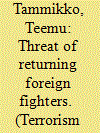

|
|
|
|
|
| Summary/Abstract |
The conflict in Syria and Iraq from 2011 onwards, and the Spanish Civil War in 1936–39 both witnessed a very relevant foreign fighter phenomenon. Even if the ideological drivers were different, both phenomena had a huge impact internationally on how foreign fighters were perceived as a threat in their home countries. In this article the official state responses to the two waves of foreign fighters have been compared with respect to the Finnish context. The volunteers in the Spanish conflict were regarded a security threat upon their return, since it was estimated that they might provide added expertise to the revolutionary left-wing movements in Finland. The returning volunteers from Syria-Iraq have not been perceived as a revolutionary threat to the Finnish political system, but as potential terrorists attacking the civilian population. After comparing different political contexts, it can be argued that the domestic political situation has in both cases had an impact on how the threats were answered in practice. Since the foreign fighters in Spain had significant political support among the growing left-wing parties, the Finnish state response towards them remained vague. In the Syria-Iraq case there has been no political support for the foreign fighters, and the issue has been effectively securitized.
|
|
|
|
|
|
|
|
|
|
|
|
|
|
|
|
| 15 |
ID:
098358


|
|
|
|
|
| Publication |
2010.
|
| Summary/Abstract |
In the decade following the death of Josip Broz Tito in May 1980, the Socialist Federal Republic of Yugoslavia (Socijalisticka Federativna Republika Jugoslavije, SFRJ) experienced increasingly catastrophic political, social and economic crises that contributed to the country's eventual disintegration and bloody ethno-national conflict in the 1990s. Attempts at reforming the decaying Titoist system, presided over by the League of Communists of Yugoslavia (Savez komunista Jugoslavije, SKJ),1 were ultimately undermined by the rise of nationalism in Serbia under Slobodan Milosevic after 1986 and the subsequent nationalist reactions in the other Yugoslav republics (Ramet 2005, pp. 54-75).
|
|
|
|
|
|
|
|
|
|
|
|
|
|
|
|
|
|
|
|
|